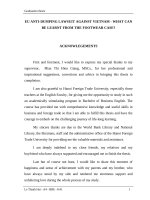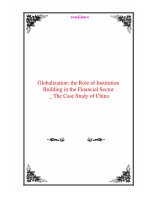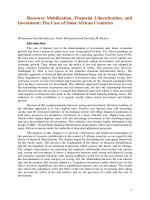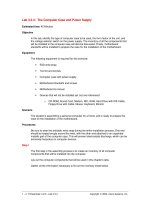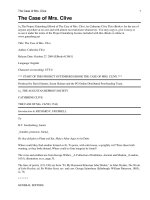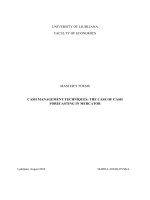The leavenworth case
Bạn đang xem bản rút gọn của tài liệu. Xem và tải ngay bản đầy đủ của tài liệu tại đây (1.23 MB, 297 trang )
TheProjectGutenbergEBookofTheLeavenworthCase,byAnnaKatherineGreen
ThiseBookisfortheuseofanyoneanywhereatnocostandwith
almostnorestrictionswhatsoever.Youmaycopyit,giveitawayor
re-useitunderthetermsoftheProjectGutenbergLicenseincluded
withthiseBookoronlineatwww.gutenberg.org
Title:TheLeavenworthCase
Author:AnnaKatherineGreen
ReleaseDate:January8,2010[EBook#4047]
LastUpdated:February4,2018
Language:English
***STARTOFTHISPROJECTGUTENBERGEBOOKTHELEAVENWORTHCASE***
ProducedbyDavidMoynihan,andDavidWidger
THELEAVENWORTHCASE
ByAnnaKatherineGreen
CONTENTS
BOOKI.THEPROBLEM
I."AGREATCASE”
II.THECORONER’SINQUEST
III.FACTSANDDEDUCTIONS
IV.ACUTS
V.EXPERTTESTIMONY
VI.SIDE-LIGHTS
VII.MARYLEAVENWORTH
VIII.CIRCUMSTANTIALEVIDENCE
IX.ADISCOVERY
X.MR.GRYCERECEIVESNEWIMPETUS
XI.THESUMMONS
XII.ELEANORES
XIII.THEPROBLEM
BOOKII.HENRYCLAVERING
XIV.MR.GRYCEATHOME
XV.WAYSOPENING
XVI.THEWILLOFAMILLIONAIRE
XVII.THEBEGINNINGOFGREATSURPRISES
XVIII.ONTHESTAIRS
XIX.INMYOFFICE
XX."TRUEMAN!TRUEMAN!TRUEMAN!”
XXI.APREJUDICE
XXII.PATCH-WORK
XXIII.THESTORYOFACHARMINGWOMAN
XXIV.AREPORTFOLLOWEDBYSMOKE
XXV.TIMOTHYCOOK
XXVI.MR.GRYCEEXPLAINSHIMSELF
BOOKIII.HANNAH
XXVII.AMYBELDEN
XXVIII.AWEIRDEXPERIENCE
XXIX.THEMISSINGWITNESS
XXX.BURNEDPAPER
XXXI."THEREBYHANGSATALE.”
XXXII.MRS.BELDEN’SNARRATIVE
XXXIII.UNEXPECTEDTESTIMONY
BOOKIV.THEPROBLEMSOLVED
XXXIV.MR.GRYCERESUMESCONTROL
XXXV.FINEWORK
XXXVI.GATHEREDTHREADS
XXXVII.CULMINATION
XXXVIII.AFULLCONFESSION
XXXIX.THEOUTCOMEOFAGREATCRIME
BOOKI.THEPROBLEM
I.“AGREATCASE”
“Adeedofdreadfulnote.”
—Macbeth.
IhadbeenajuniorpartnerinthefirmofVeeley,Carr&Raymond,attorneys
and counsellors at law, for about a year, when one morning, in the temporary
absenceofbothMr.VeeleyandMr.Carr,therecameintoourofficeayoungman
whose whole appearance was so indicative of haste and agitation that I
involuntarilyroseathisapproachandimpetuouslyinquired:
“Whatisthematter?Youhavenobadnewstotell,Ihope.”
“IhavecometoseeMr.Veeley;ishein?”
“No,” I replied; “he was unexpectedly called away this morning to
Washington; cannot be home before to-morrow; but if you will make your
businessknowntome——”
“Toyou,sir?”herepeated,turningaverycoldbutsteadyeyeonmine;then,
seemingtobesatisfiedwithhisscrutiny,continued,“ThereisnoreasonwhyI
shouldn’t;mybusinessisnosecret.IcametoinformhimthatMr.Leavenworth
isdead.”
“Mr.Leavenworth!”Iexclaimed,fallingbackastep.Mr.Leavenworthwasan
old client of our firm, to say nothing of his being the particular friend of Mr.
Veeley.
“Yes,murdered;shotthroughtheheadbysomeunknownpersonwhilesitting
athislibrarytable.”
“Shot!murdered!”Icouldscarcelybelievemyears.
“How?when?”Igasped.
“Lastnight.Atleast,sowesuppose.Hewasnotfoundtillthismorning.Iam
Mr. Leavenworth’s private secretary,” he explained, “and live in the family. It
wasadreadfulshock,”hewenton,“especiallytotheladies.”
“Dreadful!”Irepeated.“Mr.Veeleywillbeoverwhelmedbyit.”
“They are all alone,” he continued in a low businesslike way I afterwards
found tobeinseparablefromtheman;“theMissesLeavenworth,Imean—Mr.
Leavenworth’snieces;andasaninquestistobeheldthereto-dayitisdeemed
proper for them to have some one present capable of advising them. As Mr.
Veeleywastheiruncle’sbestfriend,theynaturallysentmeforhim;buthebeing
absentIamatalosswhattodoorwheretogo.”
“Iamastrangertotheladies,”wasmyhesitatingreply,“butifIcanbeofany
assistancetothem,myrespectfortheiruncleissuch——”
Theexpressionofthesecretary’seyestoppedme.Withoutseemingtowander
from my face, its pupil had suddenly dilated till it appeared to embrace my
wholepersonwithitsscope.
“Idon’tknow,”hefinallyremarked,aslightfrown,testifyingtothefactthat
he was not altogether pleased with the turn affairs were taking. “Perhaps it
wouldbebest.Theladiesmustnotbeleftalone——”
“Saynomore;Iwillgo.”And,sittingdown,Idespatchedahurriedmessage
to Mr. Veeley, after which, and the few other preparations necessary, I
accompaniedthesecretarytothestreet.
“Now,”saidI,“tellmeallyouknowofthisfrightfulaffair.”
“AllIknow?Afewwordswilldothat.Ilefthimlastnightsittingasusualat
hislibrarytable,andfoundhimthismorning,seatedinthesameplace,almostin
the same position, but with a bullet-hole in his head as large as the end of my
littlefinger.”
“Dead?”
“Stone-dead.”
“Horrible!” I exclaimed. Then, after a moment, “Could it have been a
suicide?”
“No.Thepistolwithwhichthedeedwascommittedisnottobefound.”
“Butifitwasamurder,theremusthavebeensomemotive.Mr.Leavenworth
wastoobenevolentamantohaveenemies,andifrobberywasintended——”
“Therewasnorobbery.Thereisnothingmissing,”heagaininterrupted.“The
wholeaffairisamystery.”
“Amystery?”
“Anuttermystery.”
Turning,Ilookedatmyinformantcuriously.Theinmateofahouseinwhicha
mysteriousmurderhadoccurredwasratheraninterestingobject.Butthegoodfeaturedandyettotallyunimpressivecountenanceofthemanbesidemeoffered
but little basis for even the wildest imagination to work upon, and, glancing
almostimmediatelyaway,Iasked:
“Aretheladiesverymuchovercome?”
Hetookatleastahalf-dozenstepsbeforereplying.
“Itwouldbeunnaturaliftheywerenot.”Andwhetheritwastheexpressionof
his face at the time, or the nature of the reply itself, I felt that in speaking of
these ladies to this uninteresting, self-possessed secretary of the late Mr.
Leavenworth,Iwassomehowtreadingupondangerousground.AsIhadheard
they were very accomplished women, I was not altogether pleased at this
discovery.Itwas,therefore,withacertainconsciousnessofreliefIsawaFifth
Avenuestageapproach.
“Wewilldeferourconversation,”saidI.“Here’sthestage.”
But,onceseatedwithinit,wesoondiscoveredthatallintercourseuponsucha
subject was impossible. Employing the time, therefore, in running over in my
mindwhatIknewofMr.Leavenworth,Ifoundthatmyknowledgewaslimited
to the bare fact of his being a retired merchant of great wealth and fine social
position who, in default of possessing children of his own, had taken into his
hometwonieces,oneofwhomhadalreadybeendeclaredhisheiress.Tobesure,
IhadheardMr.Veeleyspeakofhiseccentricities,givingasaninstancethisvery
factofhismakingawillinfavorofoneniecetotheutterexclusionoftheother;
butofhishabitsoflifeandconnectionwiththeworldatlarge,Iknewlittleor
nothing.
There was a great crowd in front of the house when we arrived there, and I
hadbarelytimetoobservethatitwasacornerdwellingofunusualdepthwhenI
wasseizedbythethrongandcarriedquitetothefootofthebroadstonesteps.
Extricatingmyself,thoughwithsomedifficulty,owingtotheimportunitiesofa
bootblack and butcher-boy, who seemed to think that by clinging to my arms
theymightsucceedinsmugglingthemselvesintothehouse,Imountedthesteps
and, finding the secretary, by some unaccountable good fortune, close to my
side, hurriedly rang the bell. Immediately the door opened, and a face I
recognizedasthatofoneofourcitydetectivesappearedinthegap.
“Mr.Gryce!”Iexclaimed.
“The same,” he replied. “Come in, Mr. Raymond.” And drawing us quietly
into the house, he shut the door with a grim smile on the disappointed crowd
without.“Itrustyouarenotsurprisedtoseemehere,”saidhe,holdingouthis
hand,withasideglanceatmycompanion.
“No,”Ireturned.Then,withavagueideathatIoughttointroducetheyoung
manatmyside,continued:“ThisisMr.——,Mr.——,—excuseme,butIdo
not know your name,” I said inquiringly to my companion. “The private
secretaryofthelateMr.Leavenworth,”Ihastenedtoadd.
“Oh,”hereturned,“thesecretary!Thecoronerhasbeenaskingforyou,sir.”
“Thecoronerishere,then?”
“Yes; the jury have just gone up-stairs to view the body; would you like to
followthem?”
“No, it is not necessary. I have merely come in the hope of being of some
assistancetotheyoungladies.Mr.Veeleyisaway.”
“Andyouthoughttheopportunitytoogoodtobelost,”hewenton;“justso.
Still, now that you are here, and as the case promises to be a marked one, I
should think that, as a rising young lawyer, you would wish to make yourself
acquaintedwithitinallitsdetails.Butfollowyourownjudgment.”
Imadeaneffortandovercamemyrepugnance.“Iwillgo,”saidI.
“Verywell,then,followme.”
But just as I set foot on the stairs I heard the jury descending, so, drawing
backwithMr.Gryceintoarecessbetweenthereceptionroomandtheparlor,I
hadtimetoremark:
“Theyoungmansaysitcouldnothavebeentheworkofaburglar.”
“Indeed!”fixinghiseyeonadoor-knobnearby.
“Thatnothinghasbeenfoundmissing—”
“Andthatthefasteningstothehousewereallfoundsecurethismorning;just
so.”
“Hedidnottellmethat.Inthatcase”—andIshuddered—“themurderermust
havebeeninthehouseallnight.”
Mr.Grycesmileddarklyatthedoor-knob.
“Ithasadreadfullook!”Iexclaimed.
Mr.Gryceimmediatelyfrownedatthedoor-knob.
And here let me say that Mr. Gryce, the detective, was not the thin, wiry
individual with the piercing eye you are doubtless expecting to see. On the
contrary,Mr.Grycewasaportly,comfortablepersonagewithaneyethatnever
pierced, that did not even rest on you. If it rested anywhere, it was always on
some insignificant object in the vicinity, some vase, inkstand, book, or button.
Thesethingshewouldseemtotakeintohisconfidence,maketherepositoriesof
his conclusions; but as for you—you might as well be the steeple on Trinity
Church,forallconnectionyoueverappearedtohavewithhimorhisthoughts.
Atpresent,then,Mr.Grycewas,asIhavealreadysuggested,onintimateterms
withthedoor-knob.
“Adreadfullook,”Irepeated.
Hiseyeshiftedtothebuttononmysleeve.
“Come,”hesaid,“thecoastisclearatlast.”
Leading the way, he mounted the stairs, but stopped on the upper landing.
“Mr.Raymond,”saidhe,“Iamnotinthehabitoftalkingmuchaboutthesecrets
ofmyprofession,butinthiscaseeverythingdependsupongettingtherightclue
atthestart.Wehavenocommonvillainytodealwithhere;geniushasbeenat
work. Now sometimes an absolutely uninitiated mind will intuitively catch at
something which the most highly trained intellect will miss. If such a thing
shouldoccur,rememberthatIamyourman.Don’tgoroundtalking,butcometo
me.Forthisisgoingtobeagreatcase,mindyou,agreatcase.Now,comeon.”
“Buttheladies?”
“Theyareintheroomsabove;ingrief,ofcourse,buttolerablycomposedfor
allthat,Ihear.”Andadvancingtoadoor,hepusheditopenandbeckonedmein.
Allwasdarkforamoment,butpresently,myeyesbecomingaccustomedto
theplace,Isawthatwewereinthelibrary.
“Itwasherehewasfound,”saidhe;“inthisroomanduponthisveryspot.”
Andadvancing,helaidhishandontheendofalargebaize-coveredtablethat,
togetherwithitsattendantchairs,occupiedthecentreoftheroom.“Youseefor
yourselfthatitisdirectlyoppositethisdoor,”and,crossingthefloor,hepaused
infrontofthethresholdofanarrowpassageway,openingintoaroombeyond.
“As the murdered man was discovered sitting in this chair, and consequently
withhisbacktowardsthepassageway,theassassinmusthaveadvancedthrough
thedoorwaytodeliverhisshot,pausing,letussay,abouthere.”AndMr.Gryce
planted his feet firmly upon a certain spot in the carpet, about a foot from the
thresholdbeforementioned.
“But—”Ihastenedtointerpose.
“Thereisnoroomfor‘but,’”hecried.“Wehavestudiedthesituation.”And
without deigning to dilate upon the subject, he turned immediately about and,
stepping swiftly before me, led the way into the passage named. “Wine closet,
clothes closet, washing apparatus, towel-rack,” he explained, waving his hand
from side to side as we hurried through, finishing with “Mr. Leavenworth’s
privateapartment,”asthatroomofcomfortableaspectopeneduponus.
Mr.Leavenworth’sprivateapartment!Itwasherethenthatitoughttobe,the
horrible,blood-curdlingitthatyesterdaywasaliving,breathingman.Advancing
tothebedthatwashungwithheavycurtains,Iraisedmyhandtoputthemback,
whenMr.Gryce,drawingthemfrommyclasp,disclosedlyinguponthepillowa
cold,calmfacelookingsonaturalIinvoluntarilystarted.
“His death was too sudden to distort the features,” he remarked, turning the
head to one side in a way to make visible a ghastly wound in the back of the
cranium.“Suchaholeasthatsendsamanoutoftheworldwithoutmuchnotice.
Thesurgeonwillconvinceyouitcouldneverhavebeeninflictedbyhimself.Itis
acaseofdeliberatemurder.”
Horrified, I drew hastily back, when my glance fell upon a door situated
directlyoppositemeinthesideofthewalltowardsthehall.Itappearedtobethe
onlyoutletfromtheroom,withtheexceptionofthepassagethroughwhichwe
had entered, and I could not help wondering if it was through this door the
assassin had entered on his roundabout course to the library. But Mr. Gryce,
seemingly observant of my glance, though his own was fixed upon the
chandelier,madehastetoremark,asifinreplytotheinquiryinmyface:
“Foundlockedontheinside;mayhavecomethatwayandmaynot;wedon’t
pretendtosay.”
Observingnowthat thebedwasundisturbedinitsarrangement,Iremarked,
“Hehadnotretired,then?”
“No;thetragedymustbetenhoursold.Timeforthemurderertohavestudied
thesituationandprovidedforallcontingencies.”
“Themurderer?Whomdoyoususpect?”Iwhispered.
Helookedimpassivelyattheringonmyfinger.
“Every one and nobody. It is not for me to suspect, but to detect.” And
droppingthecurtainintoitsformerpositionheledmefromtheroom.
Thecoroner’sinquestbeingnowinsession,Ifeltastrongdesiretobepresent,
so, requesting Mr. Gryce to inform the ladies that Mr. Veeley was absent from
town,andthatIhadcomeashissubstitute,torenderthemanyassistancethey
might require on so melancholy an occasion, I proceeded to the large parlor
below,andtookmyseatamongthevariouspersonsthereassembled.
II.THECORONER’SINQUEST
“Thebabyfigureofthegiantmass
Ofthingstocome.”
—TroilusandCressida.
FORafewminutesIsatdazedbythesuddenfloodoflightgreetingmefrom
themanyopenwindows;then,asthestronglycontrastingfeaturesofthescene
beforemebegantoimpressthemselvesuponmyconsciousness,Ifoundmyself
experiencingsomethingofthesamesensationofdoublepersonalitywhichyears
beforehadfollowedanenforceduseofether.Asatthattime,Iappearedtobe
living two lives at once: in two distinct places, with two separate sets of
incidents going on; so now I seemed to be divided between two irreconcilable
trainsofthought;thegorgeoushouse,itselaboratefurnishing,thelittleglimpses
of yesterday’s life, as seen in the open piano, with its sheet of music held in
placebyalady’sfan,occupyingmyattentionfullyasmuchastheaspectofthe
throngofincongruousandimpatientpeoplehuddledaboutme.
PerhapsonereasonofthislayintheextraordinarysplendoroftheroomIwas
in;theglowofsatin,glitterofbronze,andglimmerofmarblemeetingtheeyeat
everyturn.ButIamratherinclinedtothinkitwasmainlyduetotheforceand
eloquence of a certain picture which confronted me from the opposite wall. A
sweetpicture—sweetenoughandpoeticenoughtohavebeenconceivedbythe
mostidealisticofartists:simple,too—thevisionofayoungflaxen-haired,blueeyedcoquette,dressedinthecostumeoftheFirstEmpire,standinginawoodpath, looking back over her shoulder at some one following—yet with such a
dashofsomethingnotaltogethersaint-likeinthecornersofhermeekeyesand
baby-likelips,thatitimpressedmewiththeindividualityoflife.Haditnotbeen
fortheopendress,withitswaistalmostbeneaththearmpits,thehaircutshorton
theforehead,andtheperfectionoftheneckandshoulders,Ishouldhavetakenit
foraliteralportraitofoneoftheladiesofthehouse.Asitwas,Icouldnotrid
myself of the idea that one, if not both, of Mr. Leavenworth’s nieces looked
down upon me from the eyes of this entrancing blonde with the beckoning
glance and forbidding hand. So vividly did this fancy impress me that I half
shudderedasIlooked,wonderingifthissweetcreaturedidnotknowwhathad
occurredinthishousesincethehappyyesterday;andifso,howshecouldstand
there smiling so invitingly,—when suddenly I became aware that I had been
watchingthelittlecrowdofmenaboutmewithascompleteanabsorptionasif
nothingelseintheroomhadattractedmyattention;thatthefaceofthecoroner,
sternly intelligent and attentive, was as distinctly imprinted upon my mind as
that of this lovely picture, or the clearer-cut and more noble features of the
sculpturedPsyche,shininginmellowbeautyfromthecrimson-hungwindowat
hisright;yes,eventhatthevariouscountenancesofthejurymenclusteredbefore
me,commonplaceandinsignificantasmostofthemwere;thetremblingforms
oftheexcitedservantscrowdedintoafarcorner;andthestillmoredisagreeable
aspectofthepale-faced,seedyreporter,seatedatasmalltableandwritingwitha
ghoul-like avidity that made my flesh creep, were each and all as fixed an
elementintheremarkablescenebeforemeasthesplendorofthesurroundings
whichmadetheirpresencesuchanightmareofdiscordandunreality.
Ihavespokenofthecoroner.Asfortunewouldhaveit,hewasnostrangerto
me.Ihadnotonlyseenhimbefore,buthadheldfrequentconversationwithhim;
infact,knewhim.HisnamewasHammond,andhewasuniversallyregardedas
amanofmorethanordinaryacuteness,fullycapableofconductinganimportant
examination,withthenecessaryskillandaddress.InterestedasIwas,orrather
was likely to be, in this particular inquiry, I could not but congratulate myself
uponourgoodfortuneinhavingsointelligentacoroner.
As forhis jurymen,theywere, asI haveintimated,verymuchlikeallother
bodies of a similar character. Picked up at random from the streets, but from
such streets as the Fifth and Sixth Avenues, they presented much the same
appearance of average intelligence and refinement as might be seen in the
chance occupants of one of our city stages. Indeed, I marked but one amongst
themallwhoseemedtotakeanyinterestintheinquiryasaninquiry;alltherest
appearing to be actuated in the fulfilment of their duty by the commoner
instinctsofpityandindignation.
Dr. Maynard, the well-known surgeon of Thirty-sixth Street, was the first
witness called. His testimony concerned the nature of the wound found in the
murderedman’shead.Assomeofthefactspresentedbyhimarelikelytoprove
ofimportancetousinournarrative,Iwillproceedtogiveasynopsisofwhathe
said.
Prefacinghisremarkswithsomeaccountofhimself,andthemannerinwhich
hehadbeensummonedtothehousebyoneoftheservants,hewentontostate
that,uponhisarrival,hefoundthedeceasedlyingonabedinthesecond-story
frontroom,withthebloodclottedaboutapistol-woundinthebackofthehead;
having evidently been carried there from the adjoining apartment some hours
afterdeath.Itwastheonlywounddiscoveredonthebody,andhavingprobedit,
hehadfoundandextractedthebulletwhichhenowhandedtothejury.Itwas
lying in the brain, having entered at the base of the skull, passed obliquely
upward, and at once struck the medulla oblongata, causing instant death. The
fact of the ball having entered the brain in this peculiar manner he deemed
worthy of note, since it would produce not only instantaneous death, but an
utterly motionless one. Further, from the position of the bullet-hole and the
direction taken by the bullet, it was manifestly impossible that the shot should
havebeenfiredbythemanhimself,eveniftheconditionofthehairaboutthe
wound did not completely demonstrate the fact that the shot was fired from a
pointsomethreeorfourfeetdistant.Stillfurther,consideringtheangleatwhich
thebullethadenteredtheskull,itwasevidentthatthedeceasedmustnotonly
havebeenseatedatthetime,afactaboutwhichtherecouldbenodispute,buthe
mustalsohavebeenengagedinsomeoccupationwhichdrewhisheadforward.
For,inorderthataballshouldentertheheadofamansittingerectattheangle
seenhere,of45degrees,itwouldbenecessary,notonlyforthepistoltobeheld
very low down, but in a peculiar position; while if the head had been bent
forward,asintheactofwriting,amanholdingapistolnaturallywiththeelbow
bent,mightveryeasilyfireaballintothebrainattheangleobserved.
UponbeingquestionedinregardtothebodilyhealthofMr.Leavenworth,he
repliedthatthedeceasedappearedtohavebeeningoodconditionatthetimeof
his death, but that, not being his attendant physician, he could not speak
conclusivelyuponthesubjectwithoutfurtherexamination;and,totheremarkof
ajuryman,observedthathehadnotseenpistolorweaponlyinguponthefloor,
or,indeed,anywhereelseineitheroftheabove-mentionedrooms.
Imightaswelladdherewhatheafterwardsstated,thatfromthepositionof
thetable,thechair,andthedoorbehindit,themurderer,inordertosatisfyallthe
conditions imposed by the situation, must have stood upon, or just within, the
thresholdofthepassagewayleadingintotheroombeyond.Also,thatastheball
was small, and from a rifled barrel, and thus especially liable to deflections
whilepassingthroughbonesandinteguments,itseemedtohimevidentthatthe
victimhadmadenoefforttoraiseorturnhisheadwhenadvanceduponbyhis
destroyer;thefearfulconclusionbeingthatthefootstepwasanaccustomedone,
andthepresenceofitspossessorintheroomeitherknownorexpected.
Thephysician’stestimonybeingended,thecoronerpickedupthebulletwhich
had been laid on the table before him, and for a moment rolled it
contemplatively between his fingers; then, drawing a pencil from his pocket,
hastilyscrawledalineortwoonapieceofpaperand,callinganofficertohis
side, delivered some command in a low tone. The officer, taking up the slip,
looked at it for an instant knowingly, then catching up his hat left the room.
Anothermoment,andthefrontdoorclosedonhim,andawildhalloofromthe
crowdofurchinswithouttoldofhisappearanceinthestreet.SittingwhereIdid,
Ihadafullviewofthecorner.Lookingout,Isawtheofficerstopthere,haila
cab,hastilyenterit,anddisappearinthedirectionofBroadway.
III.FACTSANDDEDUCTIONS
“Confusionnowhathmadehismaster-piece;
Mostsacrilegiousmurderhathbrokeope
TheLord’sanointedtemple,andstolenthence
Thelifeofthebuilding.”
—Macbeth.
TURNINGmyattentionbackintotheroomwhereIwas,Ifoundthecoroner
consultingamemorandumthroughaveryimpressivepairofgoldeye-glasses.
“Isthebutlerhere?”heasked.
Immediatelytherewasastiramongthegroupofservantsinthecorner,andan
intelligent-looking,thoughsomewhatpompous,Irishmansteppedoutfromtheir
midst and confronted the jury. “Ah,” thought I to myself, as my glance
encounteredhisprecisewhiskers,steadyeye,andrespectfullyattentive,though
bynomeanshumble,expression,“hereisamodelservant,whoislikelytoprove
a model witness.” And I was not mistaken; Thomas, the butler, was in all
respectsoneinathousand—andheknewit.
Thecoroner,uponwhom,asuponallothersintheroom,heseemedtohave
madethelikefavorableimpression,proceededwithouthesitationtointerrogate
him.
“Yourname,Iamtold,isThomasDougherty?”
“Yes,sir.”
“Well,Thomas,howlonghaveyoubeenemployedinyourpresentsituation?”
“Itmustbeamatteroftwoyearsnow,sir.”
“YouarethepersonwhofirstdiscoveredthebodyofMr.Leavenworth?”
“Yes,sir;IandMr.Harwell.”
“AndwhoisMr.Harwell?”
“Mr.HarwellisMr.Leavenworth’sprivatesecretary,sir;theonewhodidhis
writing.”
“Very good. Now at what time of the day or night did you make this
discovery?”
“Itwasearly,sir;earlythismorning,abouteight.”
“Andwhere?”
“Inthelibrary,sir,offMr.Leavenworth’sbedroom.Wehadforcedourwayin,
feelinganxiousabouthisnotcomingtobreakfast.”
“Youforcedyourwayin;thedoorwaslocked,then?”
“Yes,sir.”
“Ontheinside?”
“ThatIcannottell;therewasnokeyinthedoor.”
“WherewasMr.Leavenworthlyingwhenyoufirstfoundhim?”
“He was not lying, sir. He was seated at the large table in the centre of his
room,hisbacktothebedroomdoor,leaningforward,hisheadonhishands.”
“Howwashedressed?”
“Inhisdinnersuit,sir,justashecamefromthetablelastnight.”
“Werethereanyevidencesintheroomthatastrugglehadtakenplace?”
“No,sir.”
“Anypistolonthefloorortable?”
“No,sir?”
“Anyreasontosupposethatrobberyhadbeenattempted?”
“No,sir.Mr.Leavenworth’swatchandpursewerebothinhispockets.”
Beingaskedtomentionwhowereinthehouseatthetimeofthediscovery,he
replied, “The young ladies, Miss Mary Leavenworth and Miss Eleanore, Mr.
Harwell,Katethecook,Mollytheupstairsgirl,andmyself.”
“Theusualmembersofthehousehold?”
“Yes,sir.”
“Nowtellmewhosedutyitistocloseupthehouseatnight.”
“Mine,sir.”
“Didyousecureitasusual,lastnight?”
“Idid,sir.”
“Whounfasteneditthismorning?”
“I,sir.”
“Howdidyoufindit?”
“JustasIleftit.”
“What,notawindowopennoradoorunlocked?”
“No,sir.”
Bythistimeyoucouldhaveheardapindrop.Thecertaintythatthemurderer,
whoever he was, had not left the house, at least till after it was opened in the
morning,seemedtoweighuponallminds.ForewarnedasIhadbeenofthefact,
Icouldnotbutfeelacertaindegreeofemotionathavingitthusbroughtbefore
me; and, moving so as to bring the butler’s face within view, searched it for
some secret token that he had spoken thus emphatically in order to cover up
some failure of duty on his own part. But it was unmoved in its candor, and
sustainedtheconcentratedgazeofallintheroomlikearock.
Being now asked when he had last seen Mr. Leavenworth alive, he replied,
“Atdinnerlastnight.”
“Hewas,however,seenlaterbysomeofyou?”
“Yes,sir;Mr.Harwellsayshesawhimaslateashalf-pasttenintheevening.”
“Whatroomdoyouoccupyinthishouse?”
“Alittleoneonthebasementfloor.”
“Andwheredotheothermembersofthehouseholdsleep?”
“Mostly on the third floor, sir; the ladies in the large back rooms, and Mr.
Harwellinthelittleoneinfront.Thegirlssleepabove.”
“TherewasnooneonthesamefloorwithMr.Leavenworth?”
“No,sir.”
“Atwhathourdidyougotobed?”
“Well,Ishouldsayabouteleven.”
“Didyouhearanynoiseinthehouseeitherbeforeorafterthattime,thatyou
remember?”
“No,sir.”
“Sothatthediscoveryyoumadethismorningwasasurprisetoyou?”
“Yes,sir.”
Requestednowtogiveamoredetailedaccountofthatdiscovery,hewenton
tosayitwasnottillMr.Leavenworthfailedtocometohisbreakfastatthecall
ofthebellthatanysuspicionaroseinthehousethatallwasnotright.Eventhen
they waited some little time before doing anything, but as minute after minute
wentbyandhedidnotcome,MissEleanoregrewanxious,andfinallyleftthe
room saying she would go and see what was the matter, but soon returned
lookingverymuchfrightened,sayingshehadknockedatheruncle’sdoor,and
had even called to him, but could get no answer. At which Mr. Harwell and
himself had gone up and together tried both doors, and, finding them locked,
burstopenthatofthelibrary,whentheycameuponMr.Leavenworth,ashehad
alreadysaid,sittingatthetable,dead.
“Andtheladies?”
“Oh,theyfollowedusupandcameintotheroomandMissEleanorefainted
away.”
“Andtheotherone,—MissMary,Ibelievetheycallher?”
“Idon’trememberanythingabouther;Iwassobusyfetchingwatertorestore
MissEleanore,Ididn’tnotice.”
“Well, how long was it before Mr. Leavenworth was carried into the next
room?”
“Almostimmediate,assoonasMissEleanorerecovered,andthatwasassoon
aseverthewatertouchedherlips.”
“Whoproposedthatthebodyshouldbecarriedfromthespot?”
“She,sir.Assoonasevershestoodupshewentovertoitandlookedatitand
shuddered,andthencallingMr.Harwellandme,badeuscarryhiminandlay
himonthebedandgoforthedoctor,whichwedid.”
“Waitamoment;didshegowithyouwhenyouwentintotheotherroom?”
“No,sir.”
“Whatdidshedo?”
“Shestayedbythelibrarytable.”
“Whatdoing?”
“Icouldn’tsee;herbackwastome.”
“Howlongdidshestaythere?”
“Shewasgonewhenwecameback.”
“Gonefromthetable?”
“Gonefromtheroom.”
“Humph!whendidyouseeheragain?”
“Inaminute.Shecameinatthelibrarydooraswewentout.”
“Anythinginherhand?”
“NotasIsee.”
“Didyoumissanythingfromthetable?”
“Ineverthoughttolook,sir.Thetablewasnothingtome.Iwasonlythinking
ofgoingforthedoctor,thoughIknewitwasofnouse.”
“Whomdidyouleaveintheroomwhenyouwentout?”
“Thecook,sir,andMolly,sir,andMissEleanore.”
“NotMissMary?”
“No,sir.”
“Verywell.Havethejuryanyquestionstoputtothisman?”
Amovementatoncetookplaceinthatprofoundbody.
“I should like to ask a few,” exclaimed a weazen-faced, excitable little man
whom I had before noticed shifting in his seat in a restless manner strongly
suggestive of an intense but hitherto repressed desire to interrupt the
proceedings.
“Verywell,sir,”returnedThomas.
But the juryman stopping to draw a deep breath, a large and decidedly
pompous man who sat at his right hand seized the opportunity to inquire in a
round,listen-to-mesortofvoice:
“Yousayyouhavebeeninthefamilyfortwoyears.Wasitwhatyoumight
callaunitedfamily?”
“United?”
“Affectionate,youknow,—ongoodtermswitheachother.”Andthejuryman
liftedtheverylongandheavywatch-chainthathungacrosshisvestasifthatas
wellashimselfhadarighttoasuitableandwell-consideredreply.
Thebutler,impressedperhapsbyhismanner,glanceduneasilyaround.“Yes,
sir,sofarasIknow.”
“Theyoungladieswereattachedtotheiruncle?”
“Oyes,sir.”
“Andtoeachother?”
“Well,yes,Isupposeso;it’snotformetosay.”
“Yousupposeso.Haveyouanyreasontothinkotherwise?”Andhedoubled
thewatch-chainabouthisfingersasifhewoulddoubleitsattentionaswellas
hisown.
Thomashesitatedamoment.Butjust ashisinterlocutorwasabout torepeat
his question, he drew himself up into a rather stiff and formal attitude and
replied:
“Well,sir,no.”
The juryman, for all his self-assertion, seemed to respect the reticence of a
servantwhodeclinedtogivehisopinioninregardtosuchamatter,anddrawing
complacentlyback,signifiedwithawaveofhishandthathehadnomoretosay.
Immediatelytheexcitablelittleman,beforementioned,slippedforwardtothe
edgeofhischairandasked,thistimewithouthesitation:“Atwhattimedidyou
unfastenthehousethismorning?”
“Aboutsix,sir.”
“Now, could any one leave the house after that time without your
knowledge?”
Thomas glanced a trifle uneasily at his fellow-servants, but answered up
promptlyandasifwithoutreserve;
“Idon’tthinkitwouldbepossibleforanybodytoleavethishouseaftersixin
themorningwithouteithermyselforthecook’sknowingofit.Folksdon’tjump
fromsecond-storywindowsinbroaddaylight,andastoleavingbythedoors,the
frontdoorcloseswithsuchaslamallthehousecanhearitfromtoptobottom,
andasfortheback-door,noonethatgoesoutofthatcangetclearoftheyard
withoutgoingbythekitchenwindow,andnoonecangobyourkitchenwindow
withoutthecook’sa-seeingofthem,thatIcanjustswearto.”Andhecastahalfquizzing, half-malicious look at the round, red-faced individual in question,
strongly suggestive of late and unforgotten bickerings over the kitchen coffeeurnandcastor.
Thisreply,whichwasofanaturecalculatedtodeepentheforebodingswhich
had already settled upon the minds of those present, produced a visible effect.
Thehousefoundlocked,andnooneseentoleaveit!Evidently,then,wehadnot
fartolookfortheassassin.
Shifting on his chair with increased fervor, if I may so speak, the juryman
glanced sharply around. But perceiving the renewed interest in the faces about
him, declined to weaken the effect of the last admission, by any further
questions. Settling, therefore, comfortably back, he left the field open for any
other juror who might choose to press the inquiry. But no one seeming to be
ready to do this, Thomas in his turn evinced impatience, and at last, looking
respectfullyaround,inquired:
“Wouldanyothergentlemanliketoaskmeanything?”
Noonereplying,hethrewahurriedglanceofrelieftowardstheservantsathis
side,then,whileeachonemarvelledatthesuddenchangethathadtakenplacein
his countenance, withdrew with an eager alacrity and evident satisfaction for
whichIcouldnotatthemomentaccount.
But the next witness proving to be none other than my acquaintance of the
morning, Mr. Harwell, I soon forgot both Thomas and the doubts his last
movementhadawakened,intheinterestwhichtheexaminationofsoimportant
apersonasthesecretaryandright-handmanofMr.Leavenworthwaslikelyto
create.
Advancingwiththecalmanddeterminedairofonewhorealizedthatlifeand
death itself might hang upon his words, Mr. Harwell took his stand before the
jurywithadegreeofdignitynotonlyhighlyprepossessinginitself,buttome,
who had not been over and above pleased with him in our first interview,
admirableandsurprising.Lacking,asIhavesaid,anydistinctivequalityofface
or form agreeable or otherwise—being what you might call in appearance a
negativesortofperson,hispale,regularfeatures,dark,well-smoothedhairand
simple whiskers, all belonging to a recognized type and very commonplace—
there was still visible, on this occasion at least, a certain self-possession in his
carriage, which went far towards making up for the want of impressiveness in
hiscountenanceandexpression.Notthateventhiswasinanywayremarkable.
Indeed, there was nothing remarkable about the man, any more than there is
aboutathousandothersyoumeeteverydayonBroadway,unlessyouexceptthe
look of concentration and solemnity which pervaded his whole person; a
solemnitywhichatthistimewouldnothavebeennoticeable,perhaps,ifithad
notappearedtobethehabitualexpressionofonewhoinhisshortlifehadseen
moreofsorrowthanjoy,lessofpleasurethancareandanxiety.
The coroner, to whom his appearance one way or the other seemed to be a
matterofnomoment,addressedhimimmediatelyandwithoutreserve:
“Yourname?”
“JamesTruemanHarwell.”
“Yourbusiness?”
“I have occupied the position of private secretary and amanuensis to Mr.
Leavenworthforthepasteightmonths.”
“YouarethepersonwholastsawMr.Leavenworthalive,areyounot?”
The young man raised his head with a haughty gesture which well-nigh
transfiguredit.
“Certainlynot,asIamnotthemanwhokilledhim.”
Thisanswer,whichseemedtointroducesomethingakintolevityorbadinage
intoanexaminationtheseriousnessofwhichwewereallbeginningtorealize,
producedanimmediaterevulsionoffeelingtowardthemanwho,infaceoffacts
revealed and to be revealed, could so lightly make use of it. A hum of
disapprovalsweptthroughtheroom,andinthatoneremark,JamesHarwelllost
all that he had previously won by the self-possession of his bearing and the
unflinchingregardofhiseye.Heseemedhimselftorealizethis,forheliftedhis
headstillhigher,thoughhisgeneralaspectremainedunchanged.
“I mean,” the coroner exclaimed, evidently nettled that the young man had
beenabletodrawsuchaconclusionfromhiswords,“thatyouwerethelastone
toseehimprevioustohisassassinationbysomeunknownindividual?”
The secretary folded his arms, whether to hide a certain tremble which had
seizedhim,orbythatsimpleactiontogaintimeforamoment’sfurtherthought,
Icouldnotthendetermine.“Sir,”herepliedatlength,“Icannotansweryesorno
tothatquestion.InallprobabilityIwasthelasttoseehimingoodhealthand
spirits,butinahouseaslargeasthisIcannotbesureofevensosimpleafactas
that.”Then,observingtheunsatisfiedlookonthefacesaround,addedslowly,“It
ismybusinesstoseehimlate.”
“Yourbusiness?Oh,ashissecretary,Isuppose?”
Hegravelynodded.
“Mr. Harwell,” the coroner went on, “the office of private secretary in this
countryisnotacommonone.Willyouexplaintouswhatyourdutieswerein
thatcapacity;inshort,whatuseMr.Leavenworthhadforsuchanassistantand
howheemployedyou?”
“Certainly. Mr. Leavenworth was, as you perhaps know, a man of great
wealth.Connectedwithvarioussocieties,clubs,institutions,etc.,besidesbeing
knownfarandnearasagivingman,hewasaccustomedeverydayofhislifeto
receive numerous letters, begging and otherwise, which it was my business to
open and answer, his private correspondence always bearing a mark upon it
whichdistinguisheditfromtherest.ButthiswasnotallIwasexpectedtodo.
Having in his early life been engaged in the tea-trade, he had made more than
onevoyagetoChina,andwasconsequentlymuchinterestedinthequestionof
internationalcommunicationbetweenthatcountryandourown.Thinkingthatin
hisvariousvisitsthere,hehadlearnedmuchwhich,ifknowntotheAmerican
people,wouldconducetoourbetterunderstandingofthenation,itspeculiarities,
and the best manner of dealing with it, he has been engaged for some time in
writingabookonthesubject,whichsameithasbeenmybusinessforthelast
eight months to assist him in preparing, by writing at his dictation three hours
out of the twenty-four, the last hour being commonly taken from the evening,
say from half-past nine to half-past ten, Mr. Leavenworth being a very
methodicalmanandaccustomedtoregulatehisownlifeandthatofthoseabout
himwithalmostmathematicalprecision.”
“Yousayyouwereaccustomedtowriteathisdictationevenings?Didyoudo
thisasusuallastevening?”

